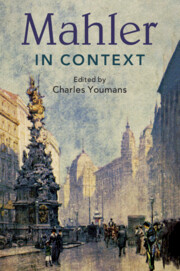Book contents
- Mahler in Context
- Composers in Context
- Mahler in Context
- Copyright page
- Dedication
- Contents
- Figures
- Music Examples
- Notes on Contributors
- Preface and Acknowledgments
- Abbreviations
- Part I Formation
- Part II Performance
- Part III Creation
- Part IV Mind, Body, Spirit
- Part V Influence
- Chapter 27 Posthumous Reputation, 1911 to World War II
- Chapter 28 Mahler and the Second Viennese School
- Chapter 29 The Mahler Revival
- Chapter 30 Broader Musical Influence
- Chapter 31 Adorno
- Chapter 32 Influences in Literature
- Chapter 33 Mahler on Disc
- Chapter 34 Film and Recent Popular Culture
- Further Reading
- Index
Chapter 30 - Broader Musical Influence
from Part V - Influence
Published online by Cambridge University Press: 18 December 2020
- Mahler in Context
- Composers in Context
- Mahler in Context
- Copyright page
- Dedication
- Contents
- Figures
- Music Examples
- Notes on Contributors
- Preface and Acknowledgments
- Abbreviations
- Part I Formation
- Part II Performance
- Part III Creation
- Part IV Mind, Body, Spirit
- Part V Influence
- Chapter 27 Posthumous Reputation, 1911 to World War II
- Chapter 28 Mahler and the Second Viennese School
- Chapter 29 The Mahler Revival
- Chapter 30 Broader Musical Influence
- Chapter 31 Adorno
- Chapter 32 Influences in Literature
- Chapter 33 Mahler on Disc
- Chapter 34 Film and Recent Popular Culture
- Further Reading
- Index
Summary
Mahler’s influence among composers intensified steadily over the course of the twentieth century. Within the Austro-German orbit, his impact is evident in the music of figures as varied as Kurt Weill, Hans Werner Henze, and Dieter Schnebel. Further afield, by the mid-1920s a distinguished array of composers including Aaron Copland and Dimitri Shostakovich had begun to engage seriously with Mahler’s music. This trend would continue in the second half of the twentieth century, with the renewed attention paid to Mahler outside Central Europe giving rise to an even more diverse group of followers, including those eager to find emancipation from some of the more influential strands of postwar modernism: George Crumb, George Rochberg, Luciano Berio, Luigi Nono, Pierre Boulez, Peter Maxwell Davies, Michael Finnissy, and Jonathan Harvey. These are surveyed here with particular attention to the diverse ways in which Mahler’s influence expressed itself.
- Type
- Chapter
- Information
- Mahler in Context , pp. 258 - 265Publisher: Cambridge University PressPrint publication year: 2020

